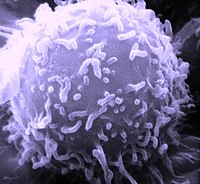
Photo from wikipedia
During the last few decades, maternal immunization as a strategy to protect young infants from infectious diseases has been increasingly recommended, yet some issues have emerged. Studies have shown that… Click to show full abstract
During the last few decades, maternal immunization as a strategy to protect young infants from infectious diseases has been increasingly recommended, yet some issues have emerged. Studies have shown that for several vaccines, such as live attenuated, toxoid and conjugated vaccines, high maternal antibody titers inhibit the infant's humoral immune response after infant vaccination. However, it is not clear whether this decreased antibody titer has any clinical impact on the infant's protection, as the cellular immune responses are often equally important in providing disease protection and may therefore compensate for diminished antibody levels. Reports describing the effect of maternal antibodies on the cellular immune response after infant vaccination are scarce, probably because such studies are expensive, labor intensive and utilize poorly standardized laboratory techniques. Therefore, this review aims to shed light on what is currently known about the cellular immune responses after infant vaccination in the presence of high (maternal) antibody titers both in animal and human studies. Overall, the findings suggest that maternally derived antibodies do not interfere with the cellular immune responses after infant vaccination. However, more research in humans is clearly needed, as most data originate from animal studies.
Journal Title: Vaccine
Year Published: 2019
Link to full text (if available)
Share on Social Media: Sign Up to like & get
recommendations!